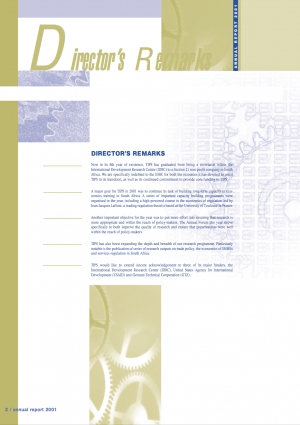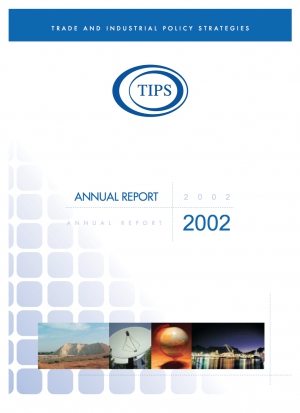Janet Wilhelm
Study to identify the best trade policies for poverty reduction in the Asia Pacific region
The University of Adelaide website - 5 January 2007
The University of Adelaide's Institute for International Trade is undertaking a $456,000 12-month study to identify the best trade policies for poverty reduction in the Asia Pacific region. The project is being supported by AusAid and the World Trade Organisation (WTO), and will involve several Schools within the University of Adelaide as well as academic and business researchers throughout the region.
Trade Information Service 2005
One of the objectives of the Department of Trade and Industry (the dti) is to develop capacitiesfor improving the export performance of businesses. To do so, the dti/TISA require easily accessible practical strategic and analytical tools for identifying growing markets to which South African firms could export. This report will help the dti/TISA and its target group of South African exporters to analyse aspects of the global market in its various facets. In doing so, thedti/TISA will strengthen its role as a provider of strategic tools to be used as a basis for analysinggrowing global markets for South African exports. A key objective of the report is to assist TISA to become an important source of strategic market information identifying the most lucrative markets and value chains for South African exports.
South Africa's low investment rate has been widely recognised as both a symptom and cause of relatively poor industrial performance in the past decade. Investment is particularly important as restructuring requires the rapid growth of new activities if potential gains are to be realised, especially with a view to increasing employment and a more diversified industrial base. The IDC played a crucial role in shaping the apartheid economy, and has an equally important role to play in addressing the apartheid industrial legacy and the fundamental transformation of the economy. This transformation includes both broad-based growth and employment generation, and black economic empowerment.
The paper reviews the rationale for development finance for industry in light of recent debates on the importance of investment. It then evaluates the role of the IDC over the past decade with specific reference to the patterns of financing and the changing structure of the South African economy. In addition, the appraisal addresses the role of the IDC in industrial policy formulation and implementation with specific reference to recent developments.
SED - Small Enterprise Development
Under the Small Enterprise Development (SED) programme, TIPS conducted a number of broad-ranging, qualitative assessments of the outcomes of government's policy, strategy and initiatives in small enterprise development.
See all research
Southern African Development Research Network (SADRN)
The Southern African Development Research Network (SADRN) was a broad-based policy and research network which aimed to increase the supply of policy-relevant research in the region and strengthen evidence-based policy-making. SADRN focused on two main themes: industrial policy and sector development at the regional level; trade policy and its linkages to pro-poor growth.
The objectives of the Network were to:
- Increase the supply of policy-relevant research in the SADC region by creating a pool of suitably-skilled researchers based in institutions in SADC
- Improve the policy-relevance of research through growing the capacity of policy-makers to be discerning research 'users'
- Develop an appreciation for evidence-based policy making by engaging policy-makers in the design, specification, implementation and review of research projects
- Build institutional capacity in key organizations in SADC via the creation of 'centres of excellence' in focused thematic areas of research.
The Botswana Institute for Development Policy Analysis (BIDPA) hosted the trade and pro-poor growth thematic group.
BIDPA is a non-governmental research organisation established by a deed of trust. The two key areas of BIDPA's mandate are development policy analysis and capacity building. Its aim is to promote policy analysis through research, capacity building, assisting organizations or individuals where appropriate as well as to monitor Botswana's economic performance. BIDPA also disseminates policy research results.
A team of researchers from the University of Mauritius, Faculty of Business, Management and Law hosted the Services Sector Development and Impact on Poverty thematic working group. For more about the University of Mauritius, please visit http://www.uom.ac.mu/.
See all research
See all policy briefs
South Africa Trade and Poverty Programme
The South Africa Trade and Poverty Programme (SATPP) provides assistance in a wide range of activities to help South Africa formulate, negotiate and implement pro-poor trade policies. It provides assistance to the private sector and civil society, as well as to government through stake-holder seminars, research and studies, assistance with institutional development within the dti, and capacity-building in a range of trade policy-related areas.
Emily Sindane
Emily joined TIPS in 2004 and is responsible for office assistance and maintenance. She has two years' general secretarial experience and has completed a number of computer software courses, including Microsoft Word and Excel.
DEFINITIONS, DATA & METHODOLOGY - Annual Review of Small Business in South Africa 2004
In literature or current economic life, the concept of 'small businesses' often covers different implicit areas of focus. The lack of clarity about what is understood as a small business can affect the reliability of research findings. Not surprisingly, since there are different concepts of businesses, there are also different qualities of data.
Lack of data is particularly acute among unregistered businesses that employ only casual staff or none, are only a minor side occupation of their owner, or operate on an ‘on-and-off’ basis. While in developed countries these cases can be considered as marginal, in South Africa many of these informal and micro enterprises are key to the livelihoods of millions of people.
Generally speaking, the methodology for this Review was defined according to three principles:
- A multiple data source approach
- Minimisation of the effect of short-term fluctuations
- Minimisation of extrapolations.




